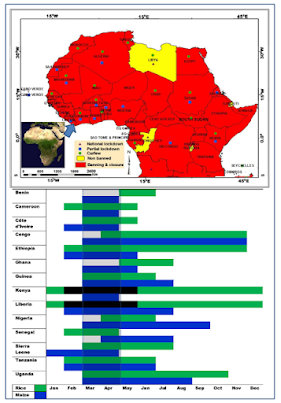Are populations at risk of hunger from Covid-19?
I intended to explore the governance of water supplies across Africa in this blog post but I came across something rather interesting, which I wanted to bring to your attention…
Covid-19 has altered everyone’s way of living and has created unprecedented socio-economic changes globally, which will have long lasting impacts. In particular, Covid-19 will have a negative impact on food security in SSA. The Independent reported the negative impact of isolation of food security, stating that ‘70% of people across Africa have warned accessing food and water would be a problem if they were required to self-isolate for 14 days’. However, the article has only acknowledged the challenge of accessing food while in isolation and has failed to account for the impact on food production. The first lockdown in March and April coincided with the planting periods (shown in figure 1) and majority of agriculture across SSA is rainfed which was heaviest during the lockdown period (Ayanlade and Radeny 2020). Thus, the reduction in cultivation during the planting season will result in food shortages throughout the year, which will further exacerbate food insecurity and malnourishment. Inequalities are intensified as only the wealthy are able to afford the limited food supplies, which means the Covid-19 crisis will have greater negative impacts on poorer households.
Figure 1 – ‘The potential crops planting impacts of COVID-19 movement restrictions’ (Ayanlade and Radeny 2020).
But what was food production like in Africa before the pandemic hit? Over $45 billion worth of agricultural products were being imported into African countries, with approximately $8 billion food products flowing through regional trade (McKinsey and Company 2020). These figures show how important the trade of food is between countries as some regions do not have adequate food or water supplies to provide for their population. However, as mentioned above, Covid has disrupted food production across the continent which has resulted in a reduction in food production, while demand persists. Most African countries already face existing vulnerabilities to their food and water systems. Combined with the impacts from Covid-19, the problem of supply and demand is exacerbated unless these issues are mitigated (McKinsey and company 2020).
Having synthesised the impacts of Covid-19 on food security in SSA, I believe that there is a light at the end of the tunnel. Inevitably, greater management and governance is needed to ensure that inequalities are not further worsened. If farmers cannot cultivate during the planting period, an alternative water supply is needed such as groundwater. The complexities of this methods have been explored in the previous blog post. We learnt that it requires huge sums of money and effective governance, which is difficult in SSA where knowledge on groundwater is limited among the government and community. But this is a unique crisis which will require a unique solution; governments need to pull out all the stops. Nonetheless, Covid-19 has had a negative impact on the economy with GDP declining and therefore, a cost-effective solution is needed. Is privatisation or a partnership the best solution to managing water supplies?


Great that you are picking up on topical and newsworthy issues! Could you provide a bit more context for your commentary by way of examples or descriptions?
ReplyDeleteThe image looks great, but I cannot make out what is there. Could it be enlarged for readability?
(GEOG0036 PGTA)
Thank you Kerry, I will take your feedback on board!
ReplyDelete